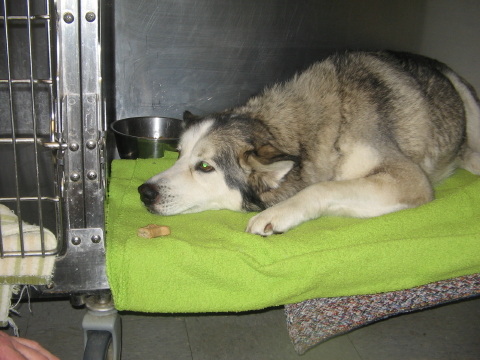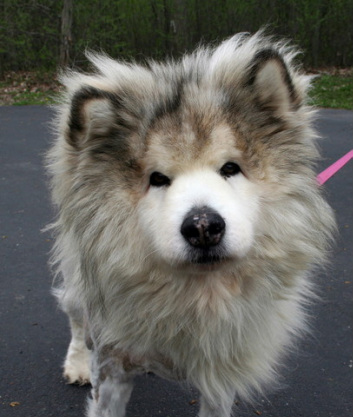Where do Rescue Dogs Come From?
Click here to read the enlightening article, 'See Spot Die' by John Dorschner.
|
Because pet shops and irresponsible breeders will sell an Alaskan Malamute to anyone bearing cash or a credit card, Malamutes sometimes end up with people who should never own any dog at all, certainly not a Malamute. Ethical breeders take back the dogs they breed, but other breeders - including backyard breeders and a few show kennels - refuse to take responsibility for dogs they have bred. In brief, some rescue dogs have survived the difficult journey from puppy mills to pet shops to homes in which they were not loved; others were bred by people who fail to take lifetime responsibility for their puppies.
Some dogs that come through rescue are turned in by owners who realize that a Malamute - or any dog - was a bad mistake. Many of these dogs have simply been chained in back yards, given food and water, but deprived of attention and affection. Some have proven too big and strong for their owners. Owners who are moving, getting divorced, or making other major life changes are sometimes unable or unwilling to include the dogs in their changed lives. |
|
A healthy, friendly, well-behaved Malamute occasionally appears on the back steps of a kind person who takes in the dog, tries and fails to find the owner, and calls us. Dogs rescued from animal shelters have either been turned in by owners or picked up by dog officers. A typical story is of a healthy, friendly young Malamute found wandering in a schoolyard or turned loose on a highway. The dog has no tags, no identifying tattoo, and has not been micro-chipped; no one responds to ads about him; no one places a lost dog ad for him.
Some rescue dogs show no signs whatsoever of abuse. In others, the signs are unmistakable. A hand-shy or rear-shy dog expects to be hit and shies away from an outstretched hand. Some of these dogs cringe at the slightest word of correction. One of the pleasures of rescuing such a dog is the privilege of teaching the lesson that, from now on, human hands and voices mean kindness and love. |
IAMRA Statistics:
2011: 50 dogs accepted into our program. 33 dogs adopted out, 15 remained in our program for adoption at year end, 1 became a Sanctuary Sweetheart (1 died in our care from terminal illness, Godspeed Curious George)
2010: 66 dogs accepted into our program. 57 dogs adopted out, 9 remained in our program for
adoption at year end.(0 euthanized/died in our care)
2009: 53 dogs accepted into our program. 27 dogs adopted out, 23 remained in our program for adoption at year end, 3 became Sanctuary Sweethearts (0 euthanized/died in our care).
2008: 65 dogs accepted into our program. 60 dogs adopted out, 5 remained in our program for adoption at year end. (0 euthanized/died in our care).
2011: 50 dogs accepted into our program. 33 dogs adopted out, 15 remained in our program for adoption at year end, 1 became a Sanctuary Sweetheart (1 died in our care from terminal illness, Godspeed Curious George)
2010: 66 dogs accepted into our program. 57 dogs adopted out, 9 remained in our program for
adoption at year end.(0 euthanized/died in our care)
2009: 53 dogs accepted into our program. 27 dogs adopted out, 23 remained in our program for adoption at year end, 3 became Sanctuary Sweethearts (0 euthanized/died in our care).
2008: 65 dogs accepted into our program. 60 dogs adopted out, 5 remained in our program for adoption at year end. (0 euthanized/died in our care).

